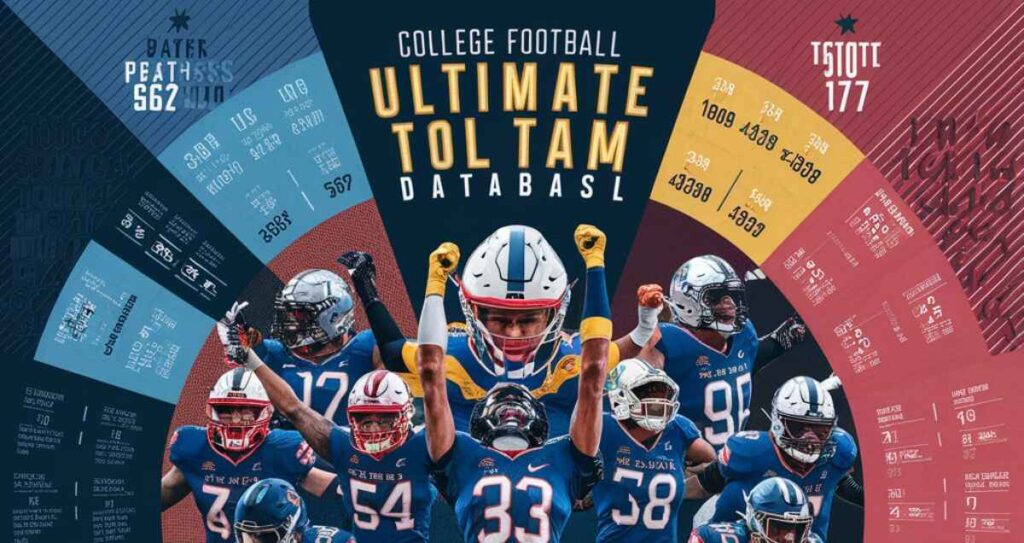College Football Ultimate Team Database is a comprehensive collection of data related to college football teams, players, statistics, and historical performances. This resource serves as an essential tool for fans, analysts, and coaches to track player and team metrics, analyze trends, and deepen their understanding of the game.
Imagine having instant access to every statistic, player profile, and historical record in college football—all in one place. A College Football Ultimate Team Database opens the door to in-depth analysis and insight, allowing fans and analysts alike to immerse themselves in the sport like never before.
Player profiles within the database provide a treasure trove of information. From career stats to injury histories, these profiles help fans and analysts assess player performance. Understanding how a player has evolved over seasons can give insights into their future contributions on the field, making it easier to support or critique them.
What is a College Football Ultimate Team Database?

A College Football Ultimate Team Database is a centralized platform that compiles a vast array of information related to college football teams, players, games, and statistics. This database is essential for various stakeholders in the sport, including:
- Fans: Enthusiasts who want to stay updated on their favorite teams and players.
- Analysts: Individuals who study player and team performance for insights.
- Coaches: Those looking for data to inform their strategies and recruitment efforts.
- Fantasy Football Players: Managers seeking to build competitive teams based on player performance.
Key Components of the Database
The effectiveness of a College Football Ultimate Team Database lies in its comprehensive nature. Here are the critical components that make it invaluable:
Player Profiles
Player profiles serve as a cornerstone of the database. Each profile typically includes:
- Biographical Information: Age, height, weight, and position.
- Career Stats: Detailed statistics for each season, including passing yards, touchdowns, interceptions, rushing yards, receptions, and defensive stats.
- Injury History: Current injuries, past injuries, and their impact on performance.
- Awards and Honors: Notable achievements, such as All-American selections, conference awards, and academic honors.
Team Data
Comprehensive team data allows for an in-depth understanding of each program. Key elements include:
- Season Records: Win-loss records for each season, including rankings and playoff appearances.
- Game Results: Scores from all games played, along with key player performances and pivotal plays.
- Coaching Staff: Information on head coaches, assistant coaches, and their tenures at the school.
Historical Performance
The historical performance data provides context for current seasons and player evaluations. This includes:
- Championships and Bowl Games: Historical records of conference championships and bowl game appearances.
- All-Time Records: Wins, losses, and notable game performances.
- Draft History: Players drafted into the NFL from the college team and their respective draft positions.
Statistical Analysis
A robust database should include statistical analysis tools that allow users to:
- Compare Players: Analyze performance across different metrics.
- Identify Trends: Explore trends over seasons, such as improvement or decline in performance.
- Predict Outcomes: Utilize historical data to predict future game outcomes or player performances.
The Significance of a College Football Ultimate Team Database

Having access to a comprehensive College Football Ultimate Team Database can significantly enhance the understanding and enjoyment of the sport. Here’s why it’s essential:
Enhanced Fan Engagement
For fans, being able to dive into player statistics, team histories, and game outcomes deepens the connection to the sport. When fans understand the stats and narratives behind their favorite teams, they become more invested in games and rivalries. The database allows fans to engage more meaningfully, enhancing the overall experience.
Informed Analysis
Analysts and commentators rely on accurate data to make informed predictions and assessments. A College Football Ultimate Team Database provides them with the necessary statistics and trends to offer insights during broadcasts, articles, and discussions. In a sport where statistics often dictate narratives, having a reliable source of information is invaluable.
Strategic Coaching Decisions
Coaches can leverage the database to analyze their teams and opponents more effectively. By studying player performance metrics, coaches can make data-driven decisions regarding lineups, play calling, and strategies. This can be particularly beneficial when preparing for upcoming games, as understanding opponent weaknesses can lead to a competitive edge.
Fantasy Football Success
For fantasy football players, a College Football Ultimate Team Database is an essential tool for crafting winning teams. With the wealth of data available, fantasy managers can make informed decisions about drafting players, managing their rosters, and making trades. This data can also help identify breakout players and potential draft steals.
Recruitment Insights
For high school athletes aspiring to play at the collegiate level, understanding how players from their position performed historically can help gauge their prospects. Coaches can use the database to identify recruiting targets based on statistical performance, physical attributes, and potential fit within their programs.
Building a College Football Ultimate Team Database
Creating a comprehensive College Football Ultimate Team Database requires meticulous planning and execution. Here are the steps involved in building such a database:
Define Your Scope
Before building the database, it’s essential to define its scope. Consider which teams, players, and statistics will be included. Will it cover only NCAA Division I, or will it extend to all divisions? This scope will guide the data collection process.
Data Collection
Collecting data can be time-consuming but is crucial for accuracy. Sources may include:
- Official NCAA Websites: For official stats and records.
- Sports News Outlets: For player profiles and game recaps.
- Historical Databases: Such as archives of past seasons and championships.
- Social Media and Player Profiles: For current player information and updates.
Data Organization
Once the data is collected, organizing it is vital. Use a database management system (DBMS) to categorize and store data efficiently. Common organizational categories include:
- Players: Individual profiles and statistics.
- Teams: Data on team performance and records.
- Games: Game results and significant plays.
Regular Updates
The world of College Football is dynamic, with constant changes in player performance, coaching staff, and team standings. Ensure that the database is updated regularly to reflect the most current information. This may involve setting up automated data collection systems or manual updates after each game.
User Accessibility
Design the database to be user-friendly. Create intuitive search features, filters, and comparison tools that allow users to access information quickly and easily. The goal is to make the data accessible for fans, analysts, and coaches alike.
Utilizing the Database: Tips and Strategies
To maximize the benefits of a College Football Ultimate Team Database, consider the following strategies:
Conduct Comparative Analysis
Utilize the database’s features to compare players and teams. This could include looking at career stats, game performances, and even team rankings over specific seasons. Comparative analysis can provide insights into player development and team dynamics.
Explore Historical Context
Delve into the historical performance data to understand how past seasons and players have shaped current narratives. Historical context enriches discussions about player comparisons and team legacies.
Follow Trends
Monitor trends within the database, such as player performances over time or changes in team strategies. Recognizing patterns can aid in predicting future performances and outcomes, which is particularly valuable for fantasy football players and analysts.
Engage with the Community
Leverage the database to engage with other fans, analysts, and coaches. Share insights, discuss findings, and contribute to forums or social media discussions. This engagement can lead to richer conversations about the sport and its players.
Stay Updated on Player News
Integrate news updates and injury reports into the database to provide real-time information about player statuses. Keeping abreast of player conditions can impact both coaching decisions and fantasy football strategies.
Case Study: The Impact of a Database on a College Football Program
To illustrate the effectiveness of a College Football Ultimate Team Database, consider the following case study involving a mid-major university program that utilized data to turn around its fortunes.
Background
The university’s football program had struggled for several seasons, facing challenges with recruitment and performance. To address these issues, the coaching staff decided to implement a data-driven approach by developing a comprehensive database.
Implementation
The coaching staff gathered extensive data on past player performances, recruitment statistics, and game outcomes. They organized this information into a database accessible to all coaching staff and players.
Results
Over the next few seasons, the program saw significant improvements:
- Recruitment: The coaching staff was able to identify under-the-radar recruits who had strong performance metrics but were overlooked by other programs.
- Performance Analysis: By analyzing game film and player statistics, coaches could refine their strategies, leading to better on-field performance.
- Player Development: With insights into individual player strengths and weaknesses, the coaching staff implemented tailored training programs that helped players improve.
As a result, the university’s football program not only improved its win-loss record but also gained national attention, leading to increased recruitment interest and support from the community.
Conclusion
A College Football Ultimate Team Database is an indispensable resource for anyone involved in college football. By offering comprehensive data on players, teams, and historical performances, this database enhances fan engagement, informs analysis, and supports coaching decisions.
With the ability to track player performance, analyze trends, and access historical data, users can dive deeper into the sport they love. Whether you’re a passionate fan, a dedicated analyst, or a strategic coach, leveraging the insights provided by a well-structured database will undoubtedly enrich your experience in the dynamic world of college football.
David Mark is a passionate sports writer and the voice behind SportsJourney. With a deep love for athletics and extensive knowledge across various sports, David delivers engaging content and expert analysis. His articles cover everything from game strategies and player profiles to sports news and commentary, providing readers with insightful and exciting perspectives on the world of sports.

